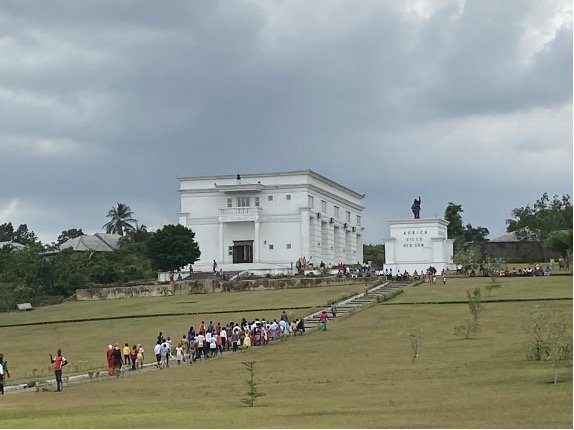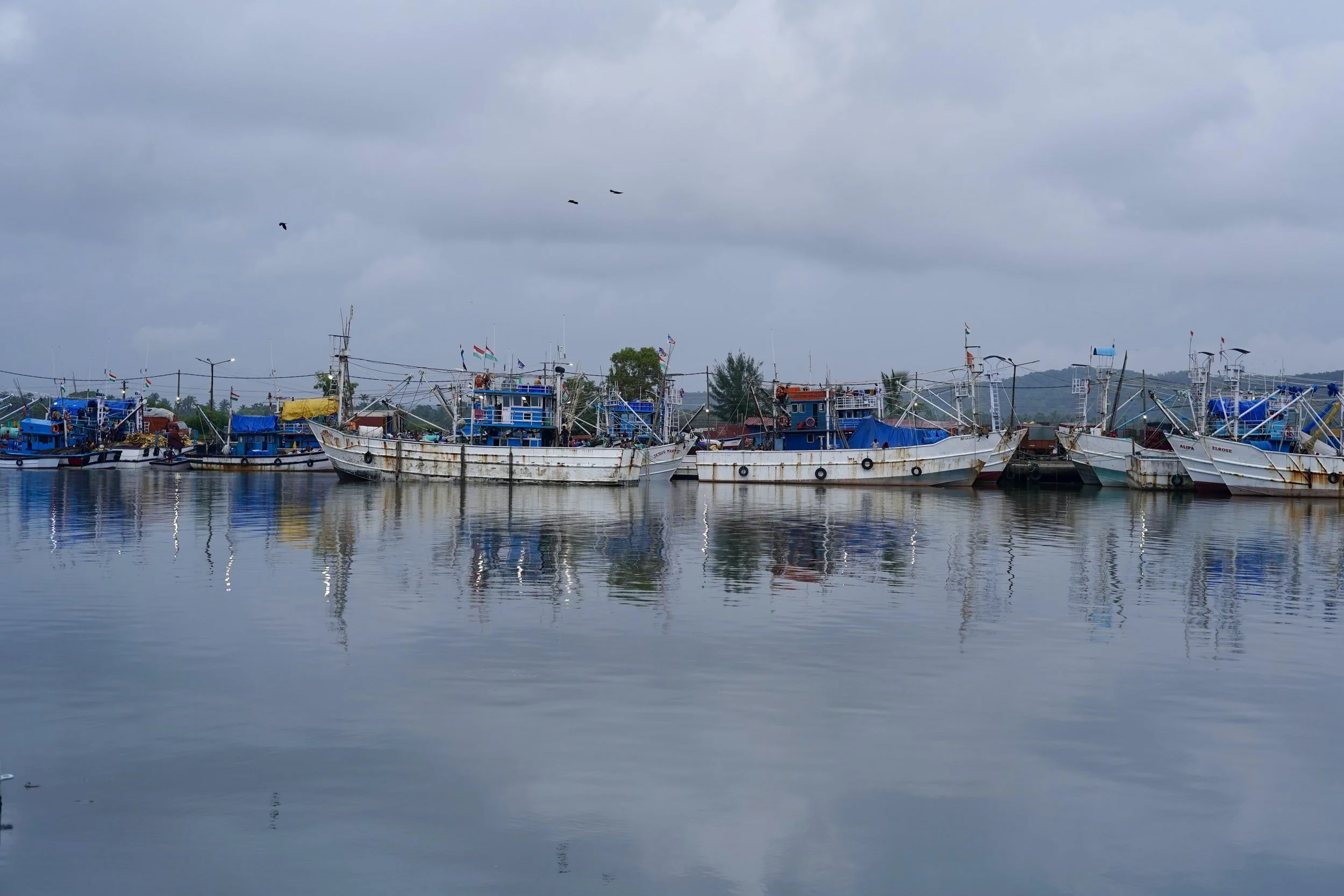Thirty years ago, the Ogoni people of the Niger Delta in Nigeria drove the multinational oil company Royal Dutch Shell (Shell) out of their territory. This nonviolent movement, led by the Movement for the Survival of the Ogoni People (MOSOP), was extraordinarily powerful. Yet, as CAL staff members saw on a visit to Ogoni in early March 2023, the struggle is far from over. The harm the oil industry wrought on this community in the 1990s runs the gamut from environmental devastation, to political oppression, to rape and murder. The dilapidated oil infrastructure in Ogoni appears to still be leaking oil into the environment, children and adults still suffer health impacts, and the fish (traditionally a major source of protein for the Ogoni population) remain scarce. But the joy and spirit of resistance is also still alive.
So-called Sustainability programs are failing cocoa farmers and their families: How Nestlé and Mondelez greenwash – and labor wash – their chocolate products
The West African cocoa industry, where two-thirds of the world’s cocoa is grown, is notorious for its human rights abuses. From hazardous child labor to child trafficking to the poverty wages that farmers earn, little of the cocoa supply chain in West Africa is “fair” or “sustainable.” Yet over the past decade, certification schemes – such as Rainforest Alliance, Fairtrade International, and Fairtrade USA – and so-called sustainability programs – like Mondelez’s Cocoa Life, Nestlé’s Cocoa Plan, Mars’ Cocoa for Generations, and Hershey’s Cocoa For Good – have proliferated.
CAL Provides New Information to CBP on Child Trafficking and Forced Child Labor in the Cocoa Sector
On February 14, 2023, Corporate Accountability Lab (CAL) submitted information to Customs and Border Protection (CBP) under Section 307 of the Tariff Act documenting instances of forced child labor in the Ivorian cocoa industry. This petition comes exactly three years after we first provided CBP with information documenting child trafficking and forced labor on the Ivorian cocoa farms that source to chocolate brands in the United States.
Trabajadores en la República Dominicana apoyan la prohibición de importar azúcar a EEUU
La semana pasada, más de 200 cañeros protestaron ante el Ministerio de Trabajo de la República Dominicana, pidiendo que se actúe sobre la situación de los derechos humanos en Central Romana a la luz de la WRO. Coordinador sindical Jesús Núñez, afirmó: "Estamos de acuerdo con las sanciones, pero no se pueden levantar sin respuesta a nuestras demandas".
Workers in Dominican Republic support US ban on sugar imports
Last week, more than 200 sugarcane workers protested before the Dominican Republic’s Ministerio de Trabajo (Ministry of Labor), calling for action on the human rights situation at Central Romana Corporation Limited in light of the US import ban on the company’s raw sugar and sugar products. Union Coordinator Jesús Nuñez said: “We’re on board with the sanctions, but they can’t be lifted without response to our demands.”
Halloween Chocolate is Haunted by Child Labor
At Corporate Accountability Lab, we love chocolate as much as anyone, but this Halloween, we’re haunted by the harrowing stories cocoa farmers told our attorneys during field visits across Cote d’Ivoire and Ghana last month. Some stories in particular stand out: one village’s entire harvest — thousands of dollars’ worth of cocoa beans — being stolen; twelve-year-old children going to work on cocoa farms full time; company representatives adjusting bean-weighing scales so that farmers are credited for less production than they are owed; devastating tree diseases wreaking havoc on cocoa farms, decreasing yields by as much as 60 percent; companies refusing to pay the premiums they promised to farmers; families without food or access to any sort of medical care; and communities without schools and teachers.
CAL Welcomes Seven New Board Members
CAL is extremely proud to welcome seven wonderful new board members to our team! Zamira Djabarova, Raphael Hoetmer, Kish Parella, Kaitlin Cordes, Jillian Tuck, Erin Essenmacher, and Elisabeth Mabus each bring unique skills, qualifications, and energy to our board. At an in-person retreat earlier in October with our four returning board members, Ed Vogel, Laura Vilim, Lupita Aguila Arteaga, and Jenna McElroy, we saw firsthand how well the group works together. We’re certain big things are to come, and we’re thankful to have the guidance of this special group of people. Read on to get to know them a bit more.
Universal Jurisdiction: Complaint on Uyghur Genocide Submitted to Argentine Court
Lawyers acting for the Uyghur Human Rights Project (UHRP) and the World Uygur Congress (WUC) filed a criminal complaint in Buenos Aires for genocide and crimes against humanity committed against Uyghurs and other Turkic people. If Argentine officials hear the case, it will be the first time that evidence of the genocide happening in northwest China has appeared before a court.
Corporate Accountability Lab reafirma su apoyo a la Comisión Intereclesial de Justicia y Paz y su trabajo en materia de justicia restaurativa y garantías de no repetición
Corporate Accountability Lab (CAL) reafirma su apoyo a la Comisión Intereclesial de Justicia y Paz (CIJP) y su compromiso hacia una paz sostenible en Colombia. En los últimos días, los ataques públicos contra el trabajo de la CIJP han aumentado. La CIJP está siendo falsamente acusada de ofrecer beneficios judiciales a favor de una campaña presidencial. CAL no puede permanecer en silencio ante estos ataques contra uno de nuestros aliados más cercanos en América Latina.
Corporate Accountability Lab reaffirms its support for the Comisión Intereclesial de Justicia y Paz and its work on restorative justice and guarantees of non-repetition
Today, Corporate Accountability Lab (CAL) reaffirms our support for the Comisión Intereclesial de Justicia y Paz (CIJP) and its commitment to sustainable peace in Colombia. In the last few days, public attacks against the work of CIJP have increased. CIJP is being falsely accused of influencing inmates to benefit a presidential campaign. We at CAL cannot remain silent in light of these attacks against one of our closest partners in Latin America.
Major tuna company sued for claiming sustainability while likely relying on forced labor
GLJ-ILRF is suing Bumble Bee under the District of Columbia Consumer Protection Procedures Act (CPPA) on behalf of itself and the general public, in the interest of Bumble Bee consumers in Washington, D.C. GLJ-ILRF, which is represented by Richman Law & Policy, seeks a declaration from the court that Bumble Bee’s practices violate the CPPA and an injunction to prohibit the company from continuing to engage in misleading advertising.
GLJ-ILRF’s claims that Bumble Bee has engaged in false and deceptive marketing are based on the company’s representations about a “fair and safe supply chain,” including that it is “best-in-class” for worker safety standards and “champion[s] sustainable fishing,” despite substantial evidence of forced labor and worker safety violations.
No More Safe Harbors: The International Need for Import Prohibitions on the Products of Forced Labor
Across the globe, an estimated 25 million people work in conditions of forced labor. In many of these cases, the private companies that supply the cotton, cocoa, and coffee we use every day directly benefit by producing and buying goods at lower costs.
Legal prohibitions on importing goods produced with forced and prison labor authorize customs and border officials to block goods from entering major markets, a strong incentive for companies to clean up their supply chains. Import prohibitions can fundamentally challenge companies’ profit models and thus their behavior: with the ability to sell goods in a country at risk, a company’s incentive to cut costs by using forced and prison labor drops drastically.
Corporate Accountability Lab Stands in Solidarity with Palestinian Civil Society
On October 19, 2021, the Israeli government outlawed and criminalized six Palestinian human rights organizations by deeming them “terrorist organizations.” This designation by the Israeli government essentially criminalizes these groups, allows the Israeli government to shut down the organizations’ offices, arrest staff members, and seize the organizations’ property. It also prohibits funding or even publicly supporting these groups. Corporate Accountability Lab stands in solidarity with these six human rights organizations and joins human rights organizations in the United States and world in denouncing the Israeli government’s civil society crackdown.
CAL finds evidence of child labor on Rainforest Alliance certified farms
In 2001, eight cocoa and chocolate companies came together to sign the Harkin-Engel Protocol, a voluntary agreement in which companies promised to eradicate child labor in the West African cocoa industry by 2005. Twenty years after the agreement went into effect, an estimated 1.56 million children work in the cocoa industry in Cote d’Ivoire and Ghana, which produce about two-thirds of the world’s cocoa. About 1.48 million of these children are engaged in hazardous child labor, which includes using a machete, carrying heavy loads -- often of cocoa beans -- and spraying pesticides.
Honoring Berta Cáceres and her Vision for Indigenous Liberation in Honduras
Berta Cáceres Flores is the “seed of freedom” for her indigenous Lenca people of Honduras and all who pay tribute to her legacy by continuing her struggle for indigenous liberation. Cáceres’s assassination near midnight on March 3, 2016 was orchestrated by employees at the hydroelectric dam company Desarrollos Energéticos (DESA), after Cáceres and her community disrupted the dam’s construction on their ancestral lands and sacred Gualcarque river. Just this week, over five years later, the former head of DESA was convicted for her murder.
CAL Files Amicus Brief Asking Supreme Court to Protect Victims' Identities in Doe v. Chiquita
Corporate Accountability Lab filed an amicus brief on behalf of a group of human rights organizations, asking the US Supreme Court to grant certiorari in the case Doe v. Chiquita. The case was brought by the family members of trade unionists, banana workers, political organizers, social activists, and others targeted and killed by the United Self-Defense Group of Colombia (AUC), a right-wing paramilitary organization in Colombia funded in part by Chiquita.
Supreme Court Upholds Intolerable Status Quo in Nestlé USA v. Doe, Rejecting Claims of Trafficked Children
On June 17, 2021, the US Supreme Court issued its decision in Nestlé USA v. Doe, a case brought on behalf of six Malian plaintiffs who had been trafficked and forced to work on cocoa farms in Cote d’Ivoire. The former forced child laborers allege that they had been tortured and enslaved. They further alleged that Nestlé USA and Cargill aided and abetted the harms against them by providing financial and technical support for exclusive purchasing rights to farms it knew or should have known exploited children.
El legado de Valmore Locarno, Víctor Orcasita y Gustavo Soler: 20 años en búsqueda de verdad y justicia en un entorno de conflicto armado
En marzo de 2021 se cumplieron 20 años de los asesinatos de los líderes sindicales Valmore Locarno y Víctor Orcasita a manos de miembros paramilitares colombianos de las Autodefensas Unidas de Colombia (AUC), supuestamente financiados, en parte, por la empresa de carbón Drummond Co., la cual tiene su casa matriz en Alabama, Estados Unidos.
In Support of Environmental & Human Rights Defender Jani Silva
Colombian Human Rights and Environmental Defender Jani Rita Silva and her organization, the Asociación de Desarrollo Integral Sostenible Perla Amazónica (ADISPA), have recently received threats challenging their work to defend the Campesino Reserve of the Amazon Pearl of Putumayo, Colombia from corporate abuse.
Escazú: el llamado para proteger a líderes y lideresas ambientales en el Día de la Tierra
En 2019, dos tercios de los asesinatos a defensores del medio ambiente en todo el mundo tuvieron lugar en América Latina. Esta tendencia no es nueva. En la última década, las comunidades que defienden sus tierras ancestrales y ecosistemas altamente biodiversos en esta región han sido consistentemente las más afectadas a nivel mundial: entre 2009 y 2019 se registraron al menos dos mil eventos victimizantes contra hombres y mujeres y doscientos contra organizaciones que defienden el medio ambiente y la tierra.

























